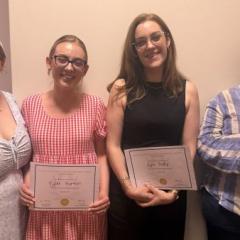By Peter Ellerton, The University of Queensland
The motto of the Royal Society, Britain’s and perhaps the world’s oldest scientific society, is “nullius in verba” which it says translates as “take nobody’s word for it”.
This is a rejection of the idea that truth can be sought through authority. It is a call to turn to experimentation and direct engagement with the physical world to discover truth. A noble sentiment indeed.
It’s also one of the key arguments used by deniers of climate science in attempts to refute both that the world is warming and that this warming is a result of human activity (anthropogenic global warming, or AGW).
This is a common approach, exemplified by Australian Senator Malcolm Roberts in his many interviews on the subject.
It gives deniers an excuse to reject the overwhelming endorsement of science organisations around the world, including the Royal Society itself, and academies of science from more than 80 other countries, that AGW is a reality.
The argument is simple, and goes a bit like this. Science does not work by appeal to authority, but rather by the acquisition of experimentally verifiable evidence. Appeals to scientific bodies are appeals to authority, so should be rejected.
The contradiction here is that the Royal Society is saying the planet is warming through human activity, but its motto seems to suggest we should not listen to it (or any other group). How can this contradiction be resolved?
Rebellion against authority
It is important to understand that the Royal Society was formed in 1660 in the shadow of a millennium of near-absolute church authority, including the general acceptance of Aristotelian natural philosophy.

The rebellion against this authority was also a celebration of the freedom to elevate the credibility of scientific exploration over that of church teachings and other accepted dogma.
Importantly, the authority to which the Royal Society’s motto alludes was a non-scientific one. The motto represents the superiority of verifiable empirical claims over claims driven by religious or political ideology. No motto could better represent the optimism of the times.
It is also important to understand that much of the science then undertaken was rather crude by modern standards and, by its reliance on very basic technology, was verifiable by individuals, or at least small groups of individuals.
Modern science
The science of the 21st century is in most areas far too complex to be understood, let alone experimentally verified, by any one person. Science is now a vast collaborative web of information characterised by the dynamic interplay and testing of ideas on a global scale.
The sharing of experimental results and the collective scrutiny of ideas forge deep and complex understandings. Teams of scientists from a range of specialities are often required to interpret and use this knowledge.
The suggestion that a subject as complex as global warming, for example, could be verified by a single person, untrained and untutored in the norms of scientific inquiry, betrays a staggering ignorance about the nature of modern science.
It is also arrogant in its assumption that something not immediately obvious to oneself cannot be the case.

The non-fallacy of appealing to authority
It’s also worth pointing out that the recourse to authority is often presented as a fallacy of reasoning, the so-called “appeal to authority” fallacy.
But this is not the case. The fallacy would be more correctly named the “appeal to false authority” – for example when celebrities who are famous for their sporting or entertainment achievements are cited in support of a particular medical treatment.
Appeals to appropriate authorities, such as experts in their fields, are one of the glues that hold our technological society together. We go to our doctor for her expertise and we are happy to take her advice without the insistence that the efficacy of potential treatments be demonstrated to us there and then.
Engineers build impressively tall buildings, pilots fly incredibly complex machines, and business experts advise on financial markets. All this expertise is confidently assimilated into our lives because we recognise its value and legitimacy.
It is not fallacious reasoning to accept expert advice. We rely on the authority of experts for quality control in many areas, including the peer-review process of science and other academic disciplines.
Assuming that the motto of the Royal Society suggests we should not listen to the collective wisdom of scientists because science is not about respecting expertise is simply indefensible.
Experts advise
In fact, the role of many such societies in the 17th and 18th centuries was to act as a conduit between scientists and governments for the provision of expert advice.
If legitimate authorities are not to be consulted, presumably there is no point in having scientists around at all, as each person would need to verify any claim on their own terms and with their own resources. That would mean a speedy decline into very dark times indeed.
Deniers of climate science such as Senator Roberts are among those most in violation of the creed “nullius in verba”. Their continued insistence on “empirical evidence” while simultaneously rejecting it (usually through invoking some conspiracy theory) suggests an immature rationality at best, and outright duplicity at worst.
Their refusal to accept empirically verified evidence because it goes against their existing beliefs is the very stuff against which the Royal Society rebelled.
They may have a voice, but they have no authority in this debate.
![]()
Peter Ellerton, Lecturer in Critical Thinking, The University of Queensland
This article was originally published on The Conversation. Read the original article.



